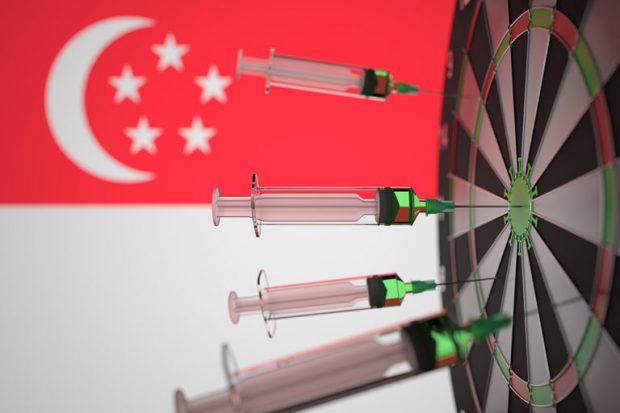
Optimism over Covid- 19 vaccine, but WHO sounds note of caution

By Ivan Lim
Former AJA President, Contributor to AsiaN
SINGAPORE: Amid the continuing dread caused by the coronavirus pandemic, two American drug-makers, Pfizerand Moderna, have announced that their experimental vaccines are more than 90 per cent effective, bringing a glimmer of hope in a gloomy world that an antidote is on the way.
Making it three in a roll, British drug manufacturer AstraZeneca has also claimed a 70 to 90 per cent effectiveness for its Covid-19 busting vaccine co-developed with Oxford University.
Up to 5.6 million people worldwide have been hit with the deadly virus since it surfaced in Wuhan, China, in December 2019. More than 1.3 million people globally have died from Covid-19, according to a tally from official sources compiled by Agence France-Presse.
Even as the Coronavirus surged, particularly in United States, Europe and India, renowned pharmaceutical firms have gone into double-quick time to produce a magic potion that will neutralise the superbug.
First, Pfizer reported that its Covid-19 vaccine, co-developed with Germany’s BioNTech, has shown a 95 percent efficacy rate in curbing infections in late-phase trials.
Next, Moderna Therapeutics has reported that its potential vaccine is 94.5 per cent effective, compared to the normal flu vaccines’ 40-60 per cent.
Both firms use a new technology whereby the messenger (m) RNA vaccine delivers the genome of the Covid-19 virus into the body to trigger immune response from T- cells and antibodies, according to experts.
“It means if you get a Moderna vaccine, you have a 95 per cent change of getting no disease,” says Moderna CEO Stephane Bancel.”
And if you get it you will get a mild disease.”
Moderna and Pfizer are seeking the greenlight from the US Food and Drug Administration for emergency use of vaccine.
Adding to the universal optimism over the vaccine breakthrough, Singapore has unveiled its Lunar-Cov19 vaccine, developed by local scientists with Arcturus Therapeutics of California, US A, could be ready for use by early next year.
According to Professor Ooi Eng Fong of Duke-National University of Singapore, the vaccine’s unique feature, co-created with Arcturus Therapeutics of California,USA, is that it could elicit an immune response from both anti-body and T-cells. Phase three trials of Lunar-Cov19 will take place in the next few months
The Economic Development Board, which has invested S$61 million in the Lunar-Cov19 development, will be able to buy up to S$236 million worth of the vaccine at pre-negotiated prices early next year.
Meanwhile, China’s SinovacBiotech said its Coronava vaccine, undergoing human trials in Brazil, Turkey and Indonesia,was showing positive results –though short of published data – in triggering a quick immune response to Covid-19.
Indian pharma firm Bio Tech has also put its Covaxin in phase three trials and the anti-Covid-19 antidote may be available in February next year, according to reports.
But, the World Health Organisation (WHO) has sought to temper exuberance of the vaccine makers.
“Some people think a vaccine will be, in a sense, the solution: the unicorn we’ve all been chasing, it is not,” said its emergencies director, Dr Michael Ryan.
He said it would take at least four to six months before a safe and effective vaccine would be readily available
There is general concern that there might not be enough vaccines for the world’s 7 billion people.
Moscow, first off the block in claiming 90 per cent effectiveness of its Sputnik V vaccine, has called for the BRICS countries — namely Brazil, Russia, India, China and South Africa —to make the drug readily available globally.
Poor nations might also not afford the prices charged by pharmaceutical companies. Moderna, for example, has set a price level between US$23 and US$37 for a vaccine dose, according to CEO Stephane Bancel. The firm is expected to roll out between 5 million and billion doses of its mRNA-1273 vaccine by end of 2021.
Rich nations such as US, Canada, United Kingdom, the European Union, Australia Japan, Israel and some Middle East states have secured their vaccine supplies through negotiated deals with the Pfizer/BioNTech and Moderna, among other vaccine producers.
China, which has five vaccine candidates in phase three trials, has pledged to make them available at affordable costs as a “global public good”.
Separately, the WHO has started a Convax initiative with the aim of supplying 2 billion doses ofCovid-19 vaccines by end of 2021 to countries regardless of wealth. As part of the effort, Unicef has pledged 2 billion doses of Covid-19 plus 1 billion syringes to poor countries, including Burundi, Afghanistan and Yemen. And at its group of 20 Summit last weekend, the world’s 20 biggest economies declared they would see to the equitable distribution of Covid-19 vaccines, drugs and tests, without leaving out poorer countries.


